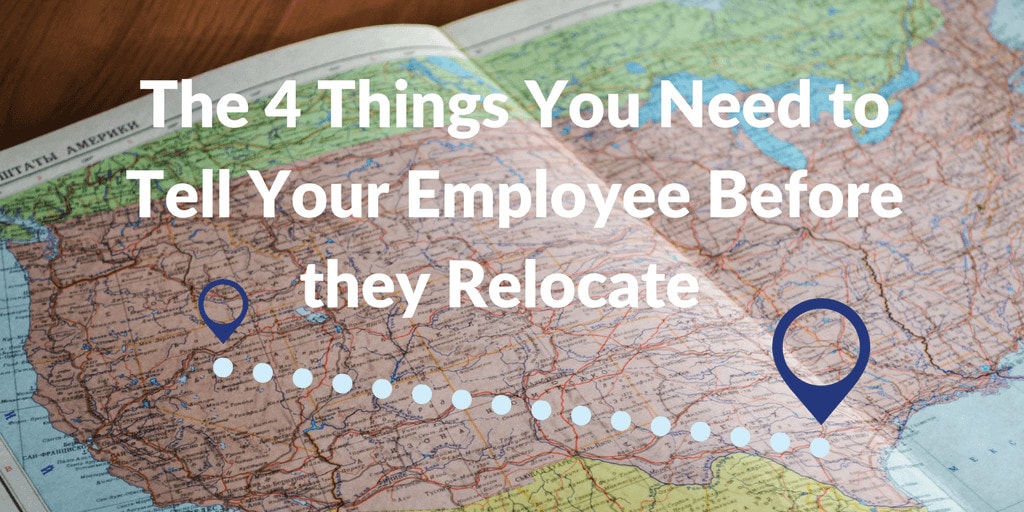The 4 Things You Need to Tell Your Employee Before they Relocate
February 22, 2018
When you recruit and hire employees, your company chooses them for various reasons. They may bring a fresh perspective, have advanced training, or offer expertise beyond the abilities of their colleagues. Overall, you spend a lot of time and effort getting these people on your team. But what happens when you need to leverage them elsewhere in your organization? Relocation may be great for your company, but it might not work out as seamlessly for the employee who has to transfer. To reduce the risks associated with a relocation, take into consideration these four aspects of employee relocations.
1) Transparent Communication
Provide your employees with clear and consistent communication throughout the entire relocation process. Start with the reason for their relocation. Are they transferring thanks to a promotion or career advancement opportunity? If so, prepare them for the new position and tasks with concrete details and performance expectations.
Give your employees any applicable contact information, such as for the human resources department and their new manager. The more information you can provide the employees, the easier it will be for them to transition to the new office. Also, be prepared to answer any and all questions or concerns the employees may have throughout the transfer and relocation process.
2) Social Needs of Employees
Consider the demographics of your employees who are transferring to a new office. Are they mostly male or female? What is the age range? According to a recent study largest age group of relocated employees falls in between 35 and 44 years old. That means they are most likely to have children and be settled down as a family unit. In fact, the Pew Research Center states that 86 percent of women 40 to 44 have kids. Take this to heart when helping your employees move.
Do the research of the new office location for the employees so they already have the answers to pressing questions. This shows you care about their personal needs and family’s happiness pending the transfer. It also gives the employees peace of mind in knowing what to expect in their new city. Here are some of the types of questions you want to answer for them:
- Does the new city have a good school district?
- What colleges, universities, and technical institutes are located in the area?
- How many safe parks are in the area?
- What is the crime rate in the city?
- What is the cost of living?
- What is the average price of renting and purchasing a single-family home?
- What kind of public transportation system is utilized?
- Which neighborhoods are the best for families?
- What is the overall culture and vibe of the city?
In addition to providing this data, check with the local chamber of commerce to get brochures and maps for the city. You can also look up the best realtors in the city to compile business cards and contact information to pass along to the employees.
3) Changes in Benefits and Workplace Rules
Another area that is often overlooked during a relocation involves the issues that employees deal with on a daily basis. Consider the following:
- Will the employee dress code be the same at the new office, or will their promotion require them to dress to impress?
- What are the office hours for their new office?
- Will vacation days and paid leave remain the same? Will these benefits roll over when the employees move?
- Are employees able to work from home at the new location?
Cover everything that will change with relocation, and be prepared to clarify any concerns among employees. These are issues employees need to deal with before they make the move. In doing so, this ensures they are fully prepared for their new job.
4) Compensation Packages for Relocations
Offering employees a compensation package gives them the financial incentive to want to make the move. A great compensation package includes money for moving expenses. Your company may also provide benefits to cover temporary living expenses or a miscellaneous expense allowance. However your company goes about compensating employees for relocating, you want to be as transparent as possible.
Start by explaining all of the benefits available with your company compensation package. Include stipulations and requirements, as well as clear definitions of what your company offers. For example, if employees are given money for moving expenses, are they required to keep receipts for proof of expenditures?
Set aside time to go over the relocation package with the employees so they can ask questions and field concerns. The more information you provide indicates your willingness to be forthright with them. This is key to a relocation process that ensures your most valued employees stick around for the long haul at the new location.
Professional Moving Services for a Relocation
Employee relocation is stressful for all parties involved. SML can ease the burden for you and your employees – contact our moving team today to request more information.











We Aim For 5 Star Service